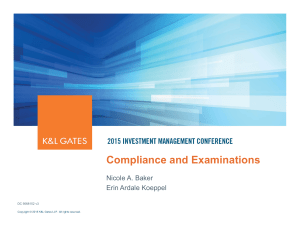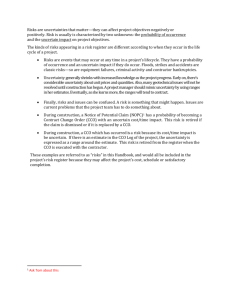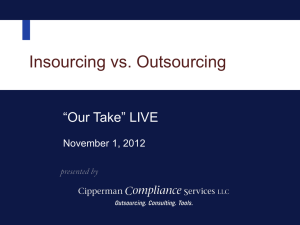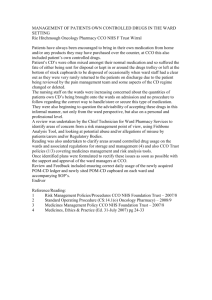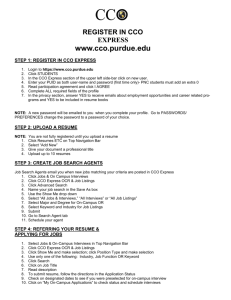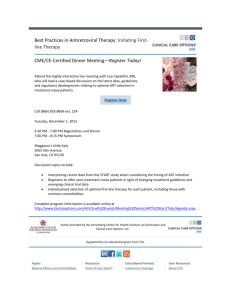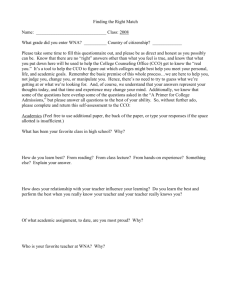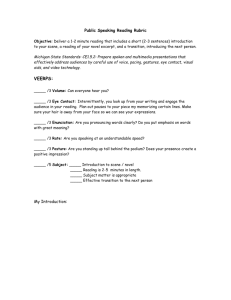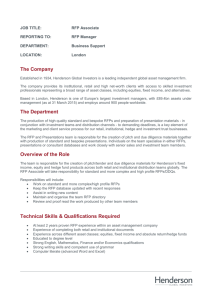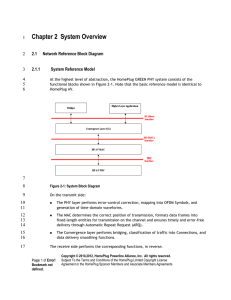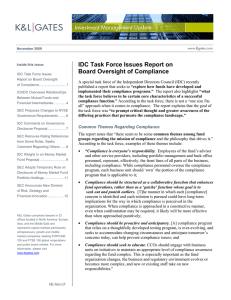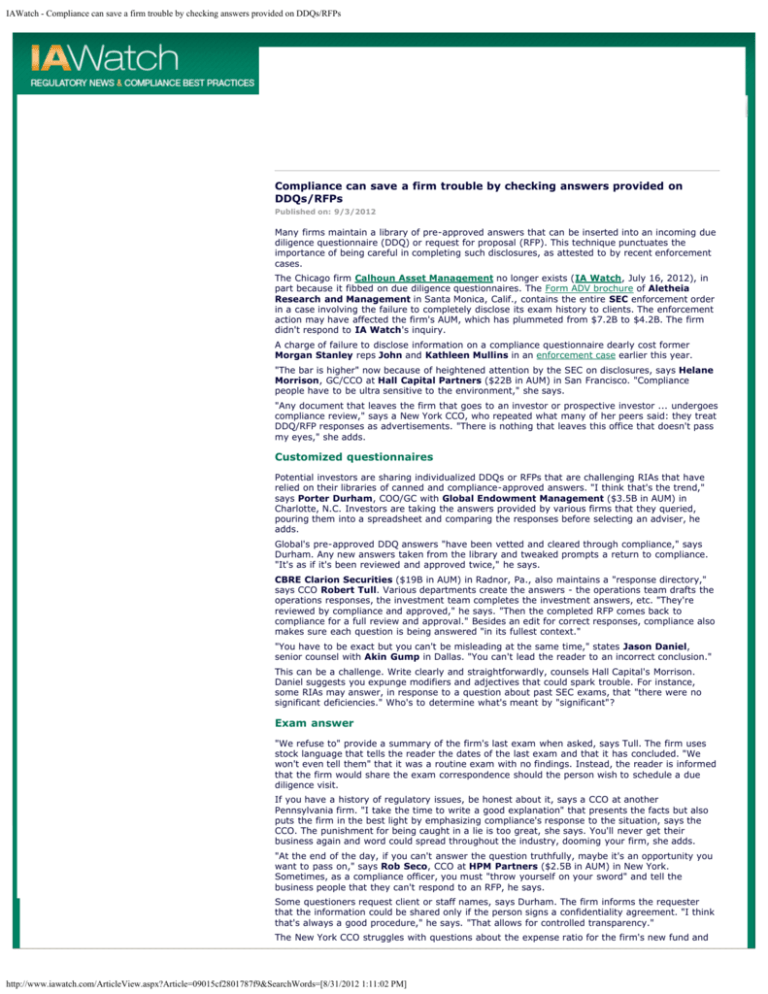
IAWatch - Compliance can save a firm trouble by checking answers provided on DDQs/RFPs
Home | About Us | Change Password | Log Out
Welcome Michelle Kennedy | My Research Alerts
NEWS & GUIDANCE
What are you looking for?
LAWS & REGULATORY ACTIONS
Back to LATEST NEWS & GUIDANCE
Advanced Search
It?
COMPLIANCE TOOLBOX
EVENTS & PRODUCTS
Print Article
Can't Find
What's Hot! IA Watch 2012 Compliance Calendar
Compliance can save a firm trouble by checking answers provided on
DDQs/RFPs
Published on: 9/3/2012
Annual Review
Form ADV
Best Execution
Hedge Funds
Books and Records
Insider Trading
Code of Ethics
SEC Examinations
Custody
Soft Dollars
Related News & Guidance
Many firms maintain a library of pre-approved answers that can be inserted into an incoming due
diligence questionnaire (DDQ) or request for proposal (RFP). This technique punctuates the
importance of being careful in completing such disclosures, as attested to by recent enforcement
cases.
The Chicago firm Calhoun Asset Management no longer exists (IA Watch, July 16, 2012), in
part because it fibbed on due diligence questionnaires. The Form ADV brochure of Aletheia
Research and Management in Santa Monica, Calif., contains the entire SEC enforcement order
in a case involving the failure to completely disclose its exam history to clients. The enforcement
action may have affected the firm's AUM, which has plummeted from $7.2B to $4.2B. The firm
didn't respond to IA Watch's inquiry.
Just because an investor asks doesn't mean you
have to share your deficiency letter
A charge of failure to disclose information on a compliance questionnaire dearly cost former
Morgan Stanley reps John and Kathleen Mullins in an enforcement case earlier this year.
Court case decrees a lesson for advisers: Be
careful who you do business with
"The bar is higher" now because of heightened attention by the SEC on disclosures, says Helane
Morrison, GC/CCO at Hall Capital Partners ($22B in AUM) in San Francisco. "Compliance
people have to be ultra sensitive to the environment," she says.
Peers offer advice for selecting a new e-mail
vendor
Related Laws & Regulatory Actions
Final Rule : Final Model Privacy Form Under the
Gramm-Leach-Bli...
Proposed Rule : Interagency Proposal for Model
Privacy Form Under ...
Litigation Release : SEC v. AA Capital Partners,
Inc. and John A. Orecc...
Related Compliance Toolbox
Red Flags of Senior Fraud
E-mail & Other E-Communications Policy
Compliance Job Description
"Any document that leaves the firm that goes to an investor or prospective investor ... undergoes
compliance review," says a New York CCO, who repeated what many of her peers said: they treat
DDQ/RFP responses as advertisements. "There is nothing that leaves this office that doesn't pass
my eyes," she adds.
Customized questionnaires
Potential investors are sharing individualized DDQs or RFPs that are challenging RIAs that have
relied on their libraries of canned and compliance-approved answers. "I think that's the trend,"
says Porter Durham, COO/GC with Global Endowment Management ($3.5B in AUM) in
Charlotte, N.C. Investors are taking the answers provided by various firms that they queried,
pouring them into a spreadsheet and comparing the responses before selecting an adviser, he
adds.
Global's pre-approved DDQ answers "have been vetted and cleared through compliance," says
Durham. Any new answers taken from the library and tweaked prompts a return to compliance.
"It's as if it's been reviewed and approved twice," he says.
CBRE Clarion Securities ($19B in AUM) in Radnor, Pa., also maintains a "response directory,"
says CCO Robert Tull. Various departments create the answers - the operations team drafts the
operations responses, the investment team completes the investment answers, etc. "They're
reviewed by compliance and approved," he says. "Then the completed RFP comes back to
compliance for a full review and approval." Besides an edit for correct responses, compliance also
makes sure each question is being answered "in its fullest context."
"You have to be exact but you can't be misleading at the same time," states Jason Daniel,
senior counsel with Akin Gump in Dallas. "You can't lead the reader to an incorrect conclusion."
Compliance Best Practices: Building Program
Efficiencies Through the Use of a
Comprehensive Calendar
Sept. 18, 2012 | 2:00 - 3:30 pm ET | Webinar
More Details...
Surviving an SEC Exam: A CCO's Guide
Oct. 16, 2012 | 2:00 - 3:30 pm ET | Webinar
More Details...
This can be a challenge. Write clearly and straightforwardly, counsels Hall Capital's Morrison.
Daniel suggests you expunge modifiers and adjectives that could spark trouble. For instance,
some RIAs may answer, in response to a question about past SEC exams, that "there were no
significant deficiencies." Who's to determine what's meant by "significant"?
Exam answer
"We refuse to" provide a summary of the firm's last exam when asked, says Tull. The firm uses
stock language that tells the reader the dates of the last exam and that it has concluded. "We
won't even tell them" that it was a routine exam with no findings. Instead, the reader is informed
that the firm would share the exam correspondence should the person wish to schedule a due
diligence visit.
If you have a history of regulatory issues, be honest about it, says a CCO at another
Pennsylvania firm. "I take the time to write a good explanation" that presents the facts but also
puts the firm in the best light by emphasizing compliance's response to the situation, says the
CCO. The punishment for being caught in a lie is too great, she says. You'll never get their
business again and word could spread throughout the industry, dooming your firm, she adds.
"At the end of the day, if you can't answer the question truthfully, maybe it's an opportunity you
want to pass on," says Rob Seco, CCO at HPM Partners ($2.5B in AUM) in New York.
Sometimes, as a compliance officer, you must "throw yourself on your sword" and tell the
business people that they can't respond to an RFP, he says.
Some questioners request client or staff names, says Durham. The firm informs the requester
that the information could be shared only if the person signs a confidentiality agreement. "I think
that's always a good procedure," he says. "That allows for controlled transparency."
The New York CCO struggles with questions about the expense ratio for the firm's new fund and
http://www.iawatch.com/ArticleView.aspx?Article=09015cf2801787f9&SearchWords=[8/31/2012 1:11:02 PM]
IAWatch - Compliance can save a firm trouble by checking answers provided on DDQs/RFPs
whether it has ever been contacted by the SEC. It answers yes to the latter question, adding that
the correspondence only confirmed the RIA's new registration.
Registering with the CFTC: Compliance
Guidance to Meet the Coming Deadline for
CPOs and CTAs
Now on CD! Webinar recorded on Aug. 14, 2012
Compliance Policies & Procedures for
Advisers: Drafting and Implementing Tips,
Plus Multiple Examples of P&Ps
Now on CD! Webinar recorded on July 10, 2012
"I encourage people to say more" than just answer what was asked, recommends Michele
Gibbons, of counsel at Jones Day in Houston. Don't forget to include your typical disclaimers
that you have inserted into other documents, e.g., your Form ADV. "When they answer on the
RFP, they forget that," she says. "It's fodder for the SEC examiners to say 'this was inaccurate.'"
Like an advertising piece, double-check your numbers and put documentation in your files to
verify the information provided, she continues.
If marketing hassles you over your stance, take the issue upstairs, suggests Seco. Gibbons says
you "can wave these enforcement actions" in their faces to stress the importance of proper
disclosure. With work, you can meet marketing's needs as well as your own, believes Morrison.
Don't forget to review your library of canned responses from time to time to ensure they remain
current, offers Michelle Kennedy with Compass Compliance Services in Greenville, S.C.
Tell IAWatch your reaction to this story
The information contained herein was current as of the publication date.
Indexed by: Client Communications Compliance Best Practices Risk Disclosure
© 2012 UCG. All Rights Reserved | Privacy Policy | Contact Us
http://www.iawatch.com/ArticleView.aspx?Article=09015cf2801787f9&SearchWords=[8/31/2012 1:11:02 PM]

